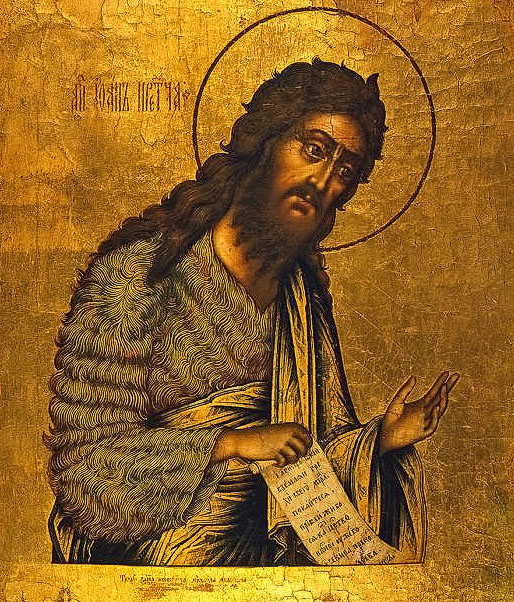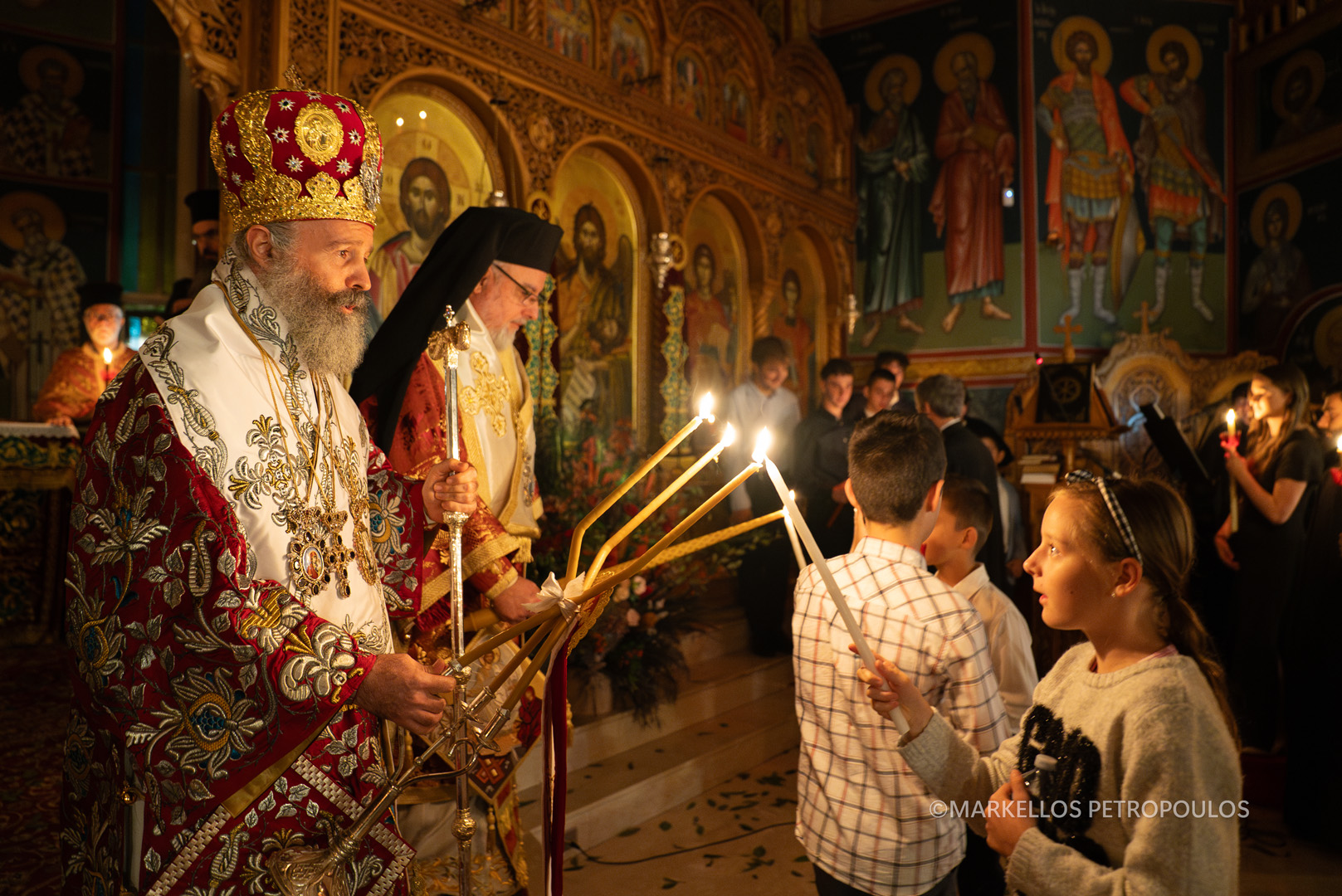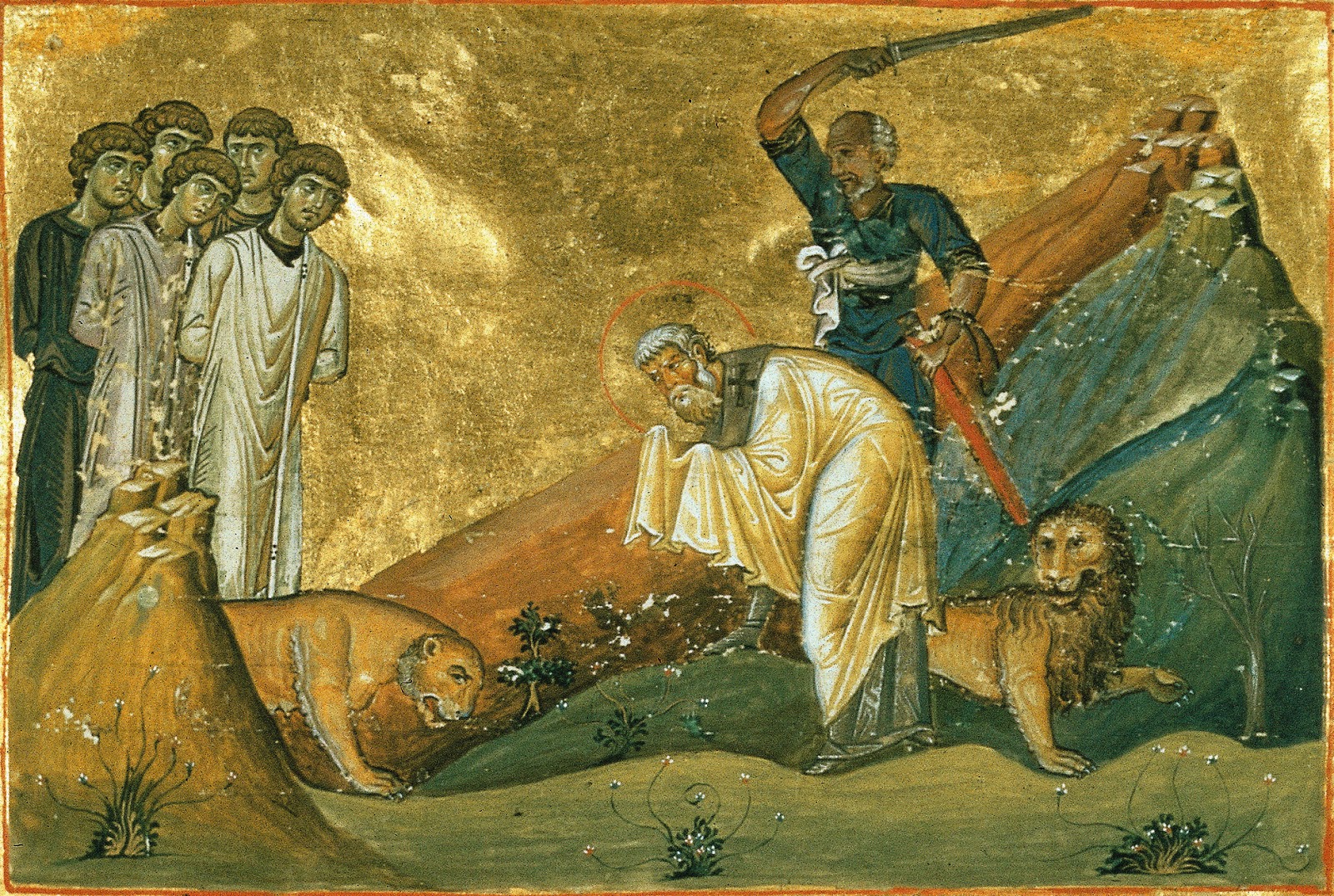Encomium on the Beheading of the Great Forerunner
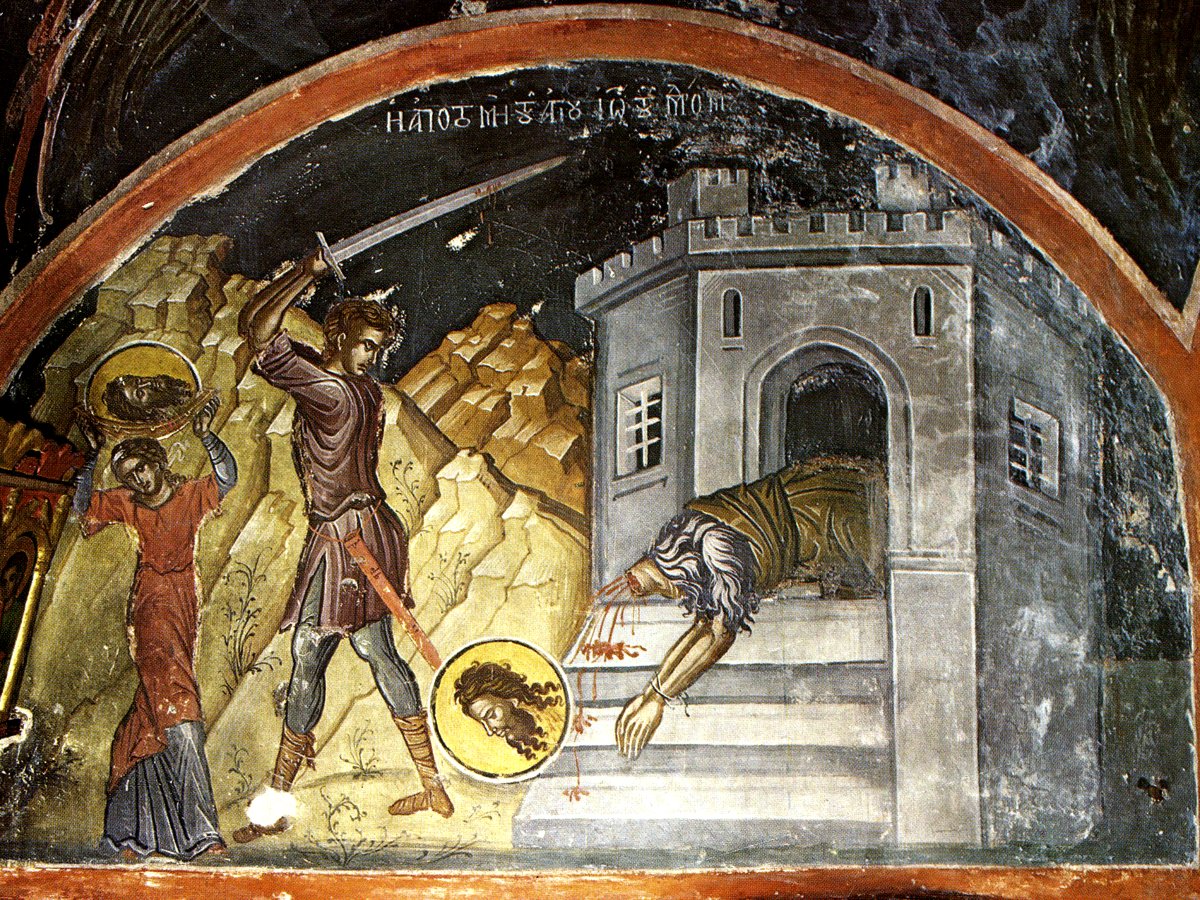
Dear God-fearing Christians, the feast which we have gathered here to celebrate together today is radiant and filled with divine joy. It is rightly called radiant because it shines from the very name of him whom we are honouring today, since he is called the lamp of the light. He is not, of course, a lamp who illumines us with material light, because then his radiance would not be enduring and constant and would be lost every time some obstacle moved in front of it. But it is light that shows the brilliant radiance of divine grace in the depths of the hearts of those who have gathered to celebrate his memory and who elevate their minds to think upon the sufferings of the righteous man, so that gazing with the eyes of our souls upon his blessed martyrdom, we shall be filled with spiritual joy.
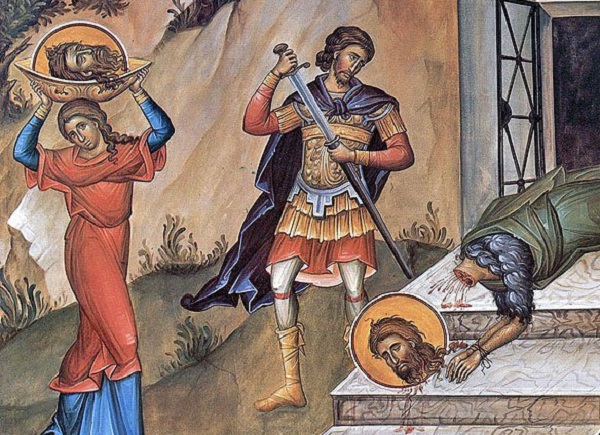
Beheading of Saint John the Forerunner, Greek Fresco
But our eyes rejoice at the sight of the blood of every saint, our ears delight to hear their messages of salvation and our lips reverence them. Because their loss grants perfect participation in the immortal and true life. I do not, of course, mean merely a drop of blood, but anything at all from their holy members- a single hair or anything they wore or touched with their hands- is desirable and valuable for those who have decided to believe and to worship God in the proper manner. This is why people who have something like this in their homes or church- that is a complete relic or a part thereof, even a very small piece- consider it a special honour and are proud of it, as if it were a treasure which advances their sanctification and ensures their salvation. And so they approach the reliquary containing the sacred dust with great reverence and touch with awe the sacred relics which are untouchable because of their sanctity.
What more do I need to say than to refer generally to the blood of all the apostles, the martyrs and prophets, which various gory murderers shed in many different ways and which now circles the earth like a rich river and extinguishes impiety?
Such was the blood of the Forerunner and Baptist of Christ, of whom we are speaking today, which he shed from his sacred neck like precious myrrh, which perfumes the whole world. This blood was not engendered by hedonistic gluttony, nor by wine, nor by any of the other foods which fatten the greedy and give them pleasure.
It was created by the grace of abstinence, which the saint practised from his infancy until his martyr’s death. And as the Lord said, John neither ate nor drank (Matth. 11, 18-19).
This blood was shed before the blood of the Lord, the immortal chalice. Because it was needful that the Forerunner of the Light, who with his radiant birth from a barren mother illumined everyone on earth, should become an effulgent herald also to those who were below the earth, that is in Hell.
This blood has boldness before the Almighty Lord, more than the blood of the righteous Abel. Because every action has within it a mystical voice, which is not produced by the vocal chords but which becomes evident from the power invested in it by the person who performs the action.
This blood is more deserving than that of the Patriarchs (Abraham, Isaac and so on), more valuable than the blood of the prophets and more sanctified than the blood of all the righteous. Because it is more wonderful even than the blood of the apostles and of the martyrs. Now these words are not mine; they’re from the Great Word, Jesus Christ, Who gave this testimony concerning the Honourable Forerunner.
It is blood which adorns the Church more beautifully than any decoration with variegated and rare flowers. It was shed for justice at the end of the era when the old law was in force, and became a flower which stands at the entrance of the presence of Christ.
But let us continue now to tell, on the basis of the Holy Gospels, how this blood was shed, by whom and for what cause. According to the Gospel, Herod arrested John, bound him and cast him into prison, because of Herodias, the wife of his brother, Philip. Because John had told him: “You’re not allowed to live with her”. So he wanted to put John to death but was afraid to do so, because all the people considered him a prophet (Matth, 14, 2-5).
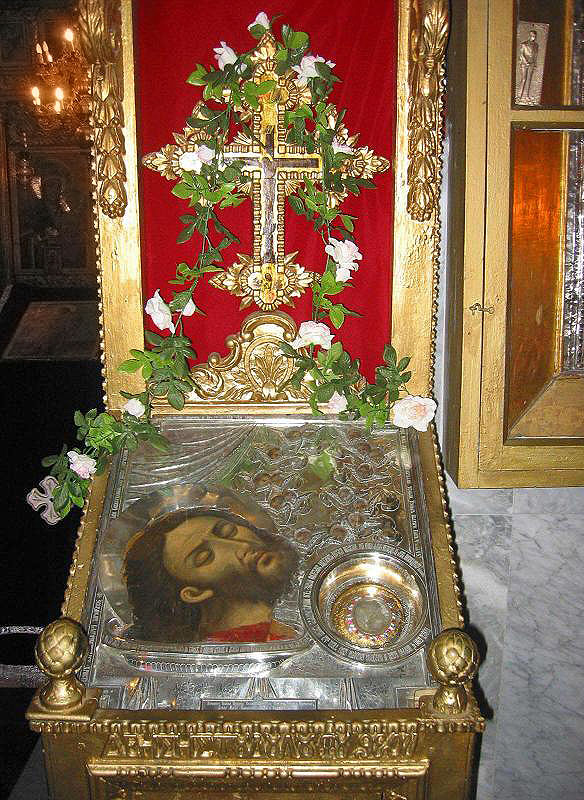
Icon of Saint John containing a small part of holy relics
Let’s see first who this Herod was, because there are two people with the same name, which is confusing, and we have to be clear who we’re talking about. This one is Herod the Tetrarch. His father, also Herod and the murderer of the Innocents, had died long before [In 4 B. C. Herod I actually had four sons named Herod].
But why did John upbraid him? Because he had abandoned his lawful wife, the daughter of King Aretas, and was living, illicitly, with the wife of his brother Philip. He could, of course, have married her legally, if she hadn’t already had children by his brother, because Mosaic law allowed this in order to provide heirs. But since she wasn’t childless, he couldn’t. She had a daughter who was also called Herodias, the offspring of a viper, the devil’s tool in her perdition. This is why John, quite rightly, rebuked him. This castigation, however, was not hubristic and was not spoken in order to wound Herod’s soul and dignity, but it was more of a reminder, the aim of which was to bring him to his senses.
So what did he say to Herod? “You’re not allowed to live with her”. He reminded him of the divine law, as if saying to him: “Look and see what the Law orders you to do. If there are two brothers and one of them dies without issue, the widow is not allowed to marry a stranger. The brother of the deceased shall marry her and the child who is born will take the name of the deceased, and thus his name will not be lost in Israel (Deut. 15, 5). That’s what the law says. But you’ve taken the wife of your brother and she already has a child. Don’t transgress against the ordinance put in place by the legislator. And don’t soil your royal purple with inadmissible incest. Don’t be seen to be doing something illegal when you should be giving your subjects an example of willing and glad observance of the law. And if you do fall into this error, you’ll be punished, because those in high office are punished more severely”.
But since he’d only recently come to power, Herod forgot about God. He was furious, boiling with rage, and would not accept the rebuke. He did not imitate David, who, when he was chastised by the prophet Nathan for the sin of adultery, said: “I have sinned before you, Lord” (II Kings 12-13). And the Lord forgave him, because of his humility. Herod, on the other hand, had John arrested, bound and cast into prison (Matth. 14, 3). So the one who was a prisoner of the passion of lewdness arrested him who lived in the most sublime freedom, because of his holy life. He who was bound by the magical cords of debauchery, put bonds on him who was liberated from all things, living as he did outside any binding relationship. He who was, in practice, sinking deep into the mire, put in prison him who was the guard and herald of the Church.
For the sake of Herodias, the wife of his brother, Philip (Matth. 14, 9). For the sake of Herodias, who shared the morals of Delilah, a true tool of the devil. Because it was she who encouraged him who shared her bed- or illicit love we should really say- and made him furious with John. She told him: “I’m a queen and I can’t be made a laughing-stock by the son of Zachariah. Imprison the tongue that’s breaking my bones. Stab, at once, him whose words are wounding my soul like arrows”. And although he wanted to put him to death, he didn’t do so because he was afraid of the people, who considered John a prophet and respected him as such (Matth. 14, 5). Because if people in power want to do something illegal, they can’t execute it as soon as they’ve thought of it, for two reasons: first because they’re ashamed and fear their subjects; and second because they wait until the opportunity arises to put into effect the hatred in their souls without risk to themselves.
So while they were celebrating Herod’s birthday, Herodias’ daughter came out in front of them and danced. She pleased Herod very much and he swore to grant her anything she wanted (Matth. 14, 6).
On the day when he ought to have been thanking God for bringing him into the light of this life, he chose the works of darkness.. This was a day meant for spiritual joy, not for dancing, and certainly not for women dancing in front of men. What did this dance produce? The oath. And from that? Murder. Root out evil and lawlessness will not flourish. But if evil does take root, it’ll bear fruit, that is, it’ll be put into effect. Herodias’ daughter danced in the midst of the guests and pleased Herod. What else would the harlot-trained girl have learned from her mother, other than to dance provocatively and with such skill as to please Herod greatly. This is why he swore an oath to grant her whatever she wished. This is how rashly the tongues of people run away with them when they lose themselves in the passions of degradation: they blurt out in front of everyone, without thinking, whatever comes into their mind. The girl, schooled by her mother, brought about the hideous decapitation of Saint John, which the venomous Herodias had been wanting to achieve for a long time. I imagine she would have said: “This is the chance we’ve been looking for, my child. You’ve managed, with your dancing feet, to get him to offer me what I wanted. You’ve ended my pain with your skilful song. Let’s bury the man who’s rebuking us. Go quickly and tell Herod: ‘Give me John the Baptist’s head on a platter’ (Matth. 14, 8). What a ferocious and murderous demand! Even though she didn’t have the right to think and enjoy the spectacle of the murder, she outdid everyone in cruelty. What a crazed murderess! Not content with decapitation, you arranged for the head to be brought to you on a platter. What a depraved and debauched woman! Your brutality outstrips even that of blood-stained Jezebel.
The Gospel tells us that the king was saddened. But because he had sworn an oath and had promised in front of his guests, he ordered that she be given the head. He sent to the prison and had John beheaded. Then they set the head on a platter and brought it to the girl and her mother (Matth. 14, 11).
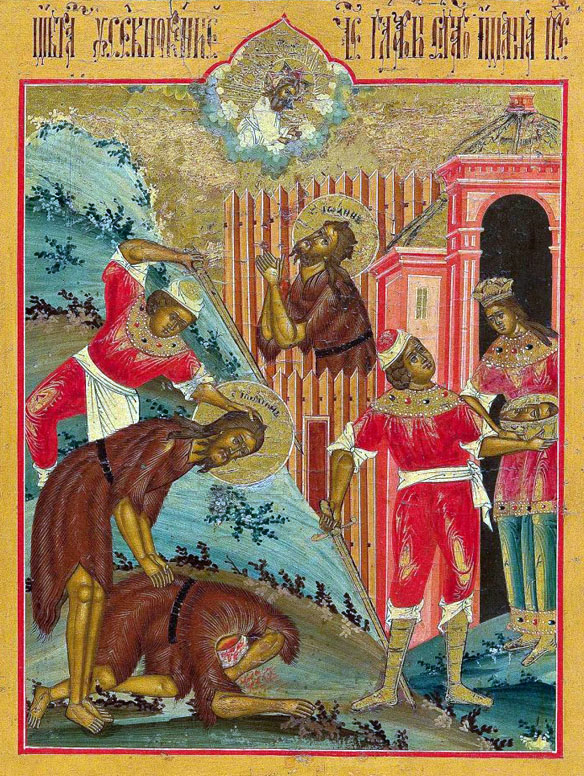
Beheading of Saint John the Forerunner, Russian Icon
What an evil end to a diabolical coil! Who aimed the stroke of the deathly sword at the saintly head? A lawless servant, who like another Doeg, did not imitate those Jews who with circumspection and bravery stood up to King Saul when he ordered them to murder God’s prophets. “And they brought the head of John on a platter”. What should we call this revel? A banquet or the scene of a murder? What should we call the addle-pated guests? Fellow diners or blood-stained participants?
What an unprecedented sight! What a sinful sight! On the one hand, they were offering chicken and, on the other, a platter with the head of a prophet. From one side, rich clear wine was flowing and from the other the blood of a righteous man was gushing.
How terrible it is for me to say it and dreadful to express!
“And they gave it to the girl and she took it to her mother”. What a sinful sight! Alas! How utterly macabre! The invaluable head was exchanged for a worthless action; the pure and inviolate head, worthy of respect even from the angels, was given for an accursed and impious act. And she handed it to her mother as if she were giving her well-cooked food. To her who in her manic fury had directed the death, as if the child were saying: “Here you are, mother, meat of the flesh of him who lived on earth as if fleshless. Drink the blood of the faster. Once and for all we’ve now shut the mouth of him who rebuked us”.
…to be continued
Source: pemptousia.com
